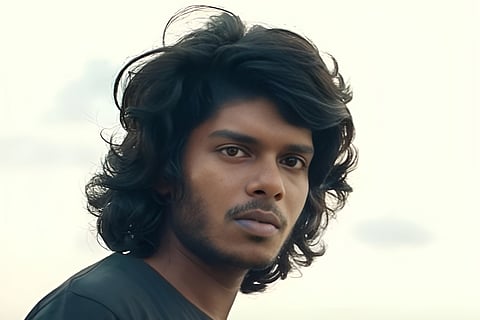

Vedan means hunter in Malayalam. Recall that Valmiki, the author of the Ramayan once referred to as Ratnakara, was also a hunter.
In Kerala, where just about every other person you run into is either a professor or a poet—and, unreasonably, often both—the man making waves with his music is a rap artiste: Hirandas Murali, or Vedan, as he likes to call himself. A slender man in his early 20s with eyes bright as bulbs, a funky hairstyle, and skin dark as the night that befalls the forest.
Vedan’s viewership runs into millions. Never has social media technology been so keenly weaponised to subvert the caste system in the curated progressivism of a narcissistic state. Even better, in a country that is now competing to take credit for the caste census, Vedan shows the way. He is not begging for mercy or appealing for justice, but rapping out a code of power in his art. He is what psychologists call ‘resourced’—resourced enough to start a cultural war.
On April 30, a district court in Kerala granted Vedan bail in a wildlife case—he wore a ‘tiger tooth’ as a locket—citing a weak prima facie case pending forensic analysis of the ‘tiger tooth’; gifted, Vedan says, by a fan. Earlier in the week, he had been arrested for possession of 6 grams of cannabis. Conditions included a Rs 50,000 bond, passport surrender and weekly check-ins. There was also a cache of Rs 9.5 lakh in cash in his apartment.
Emerging into sunlight, Vedan spoke with Valmiki-like resolve: “I’m trying to be better,” he said, apologising to young fans for his narcotics use. “These aren’t good habits.”
Vedan’s 2020 debut, ‘Voice of the Voiceless’, was a proclamation of his independence. Though not too many people have made the connection, poets like the late Kadammanitta Ramakrishnan used a similar thesaurus for their poems to challenge the status quo.
Vedan is not situated in a cultural vacuum. There are other rap groups of the repressed doing just as well. Hanumankind’s ‘Asura’ is equally raw and challenging. Both offline and online, these youngsters are putting out songs whose craft has a Tupac Shakurian intensity of music, poetry and politics.
In the upper middle class Thrissur’s colonies and Kochi’s five-star fringes, and the rest of the remittance-enhanced social circles, Vedan and others are unleashing ferocious tides of cultural energies. It would be fun to watch these young, emergent millionaire rap artistes resist the co-option that success brings. A sure sign of this eventuality would be a five-star literature fest featuring these young artistes. Festivals bury artists alive, and they feel silly when unearthed.
In Kerala, all progress—from climate warming to the recently opened Vizhinjam port—is naturally associated a priori with a Marxist party initiative. Indeed, if the party is not taking up an issue, the issue is at fault for its reactionary potential.
It is into this arena of complex and Left-dominated politics that Vedan and his friends are rapping their way. Other examples of performing protest poetry include Arivu (Knowledge) and Street Academics’ hip-hop. The problem is not just their popularity; it’s the surprising discovery they will make—cash, cars and a full stomach will challenge their art from within. Nothing kills creativity as much as comfort.
Vedan’s 2020 debut, ‘Voice of the Voiceless’, shattered this bastion. Its YouTube release saw a deluge of fandom in Malayalam and Tamil. “I am neither a Paanan, Parayan nor Pulayan, nor you a Lord,” Vedan rapped, bringing about red-blue visuals—Ambedkar’s defiance meeting Marx’s revolution—electrifying Kerala’s youth, who, ironically, are also aspirants trying to get on the next flight to Canada, because the state has nothing to offer for a career. This is what makes Kerala a test case.
Sooraj Cherukat’s Hanumankind, meanwhile, emerged with a visceral elegy for the oppressed, resonating equally in gated colonies and slums. Globally, Vedan and Hanumankind echo rap’s great renegades. That a narrow wedge of society is finding its voice in a global tradition, not national, not wholly regional either, though a patchwork of both—speaks much for the musical/political revolution that social media has pioneered in Kerala.
Like Tupac Shakur, who declared, “I’m not saying I’m gonna change the world, but I guarantee that I will spark the brain that will,” their lyrics experience the fire and agony of existence.
A counterpoint they must know is that somehow, a career in the trade that is awarded with acceptance could be its own denial. Vedan’s 2024 track ‘Kuthanthram’ for the hit movie Manjummel Boys brought him mainstream fame; but, for a Dalit rapper, this early acclaim could likely burn his creativity. Hanuman Kind, too, navigates these seductive waters.
Vedan and Hanuman Kind are Kerala’s conscience, their rap a mirror to a state that trumpets equality but flinches at its price. In a cultural arena where upper-caste gatekeepers hold sway, their music, alongside Arivu’s and Street Academics’, is a siege on those walls. The police cases will fade, but the questions they raise—about caste, power and who gets to speak—will haunt Kerala’s intellect. As will their voices, haunting in the hearts of those who refuse to kneel.
(Views are personal)
C P Surendran
Poet, novelist and screenplay writer whose latest novel is One Love and the Many Lives of Osip B
(cpsurendran@gmail.com)